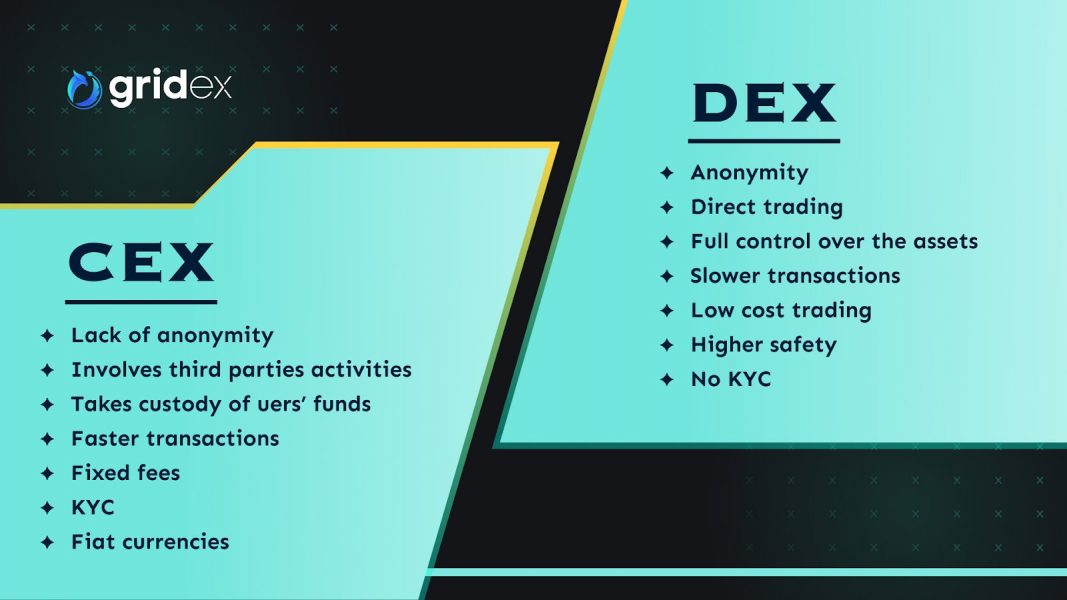Proving their supremacy when it comes to investor security and prioritizing investor interests is where decentralized finance has the ability to shine.
For most retail crypto investors, centralized digital marketplaces like Binance, Coinbase, Kraken, and many more have been the preferred gateway to the world of cryptocurrency trading. However, as leaked customer data like the recent Gemini case and misappropriated funds like the FTX debacle continue to plague the space, crypto investors have been looking into alternatives. According to a Delphi Digital analysis following the FTX crash, DEX tokens saw a 24% uptick, and CEX tokens saw a 2% decline.
The lack of transparency in how CEX operations are run has become a major driver for this trend shift. What’s more, a lot of platforms claim complete decentralization when in fact, there’s a centralized element to them. But do DEXs have what it takes to take over the crypto exchange space?
Are DEXs better than CEXs?
The centralized control over customer funds that companies running CEXs have combined with a lack of transparency of what goes on behind the scenes at these businesses is the most concerning aspect of centralized trading at the moment. This centralization, unfortunately, allows for the misappropriation of customer funds to happen, as was the case with FTX.
The surge of automated market makers (AMMs) was led by Uniswap, showing the crypto world the potential of DEXs. Order book DEXs such as dYdX that use zk-rollups to implement order books off-chain introduced an alternative solution to replace centralized exchanges. The uprise in DEXs is just the beginning.
While offering users more convenience when transferring or swapping tokens, centralized exchange wallets are decidedly less secure than non-custodial storage solutions. DEXs offer their users flexibility when it comes to storing their crypto tokens and do not rely on their user’s crypto holdings to generate revenue or indulge in secondary transactions.

DEX deficiencies that need addressing
Before concluding that DEXs can challenge the existing order and potentially overthrow CEXs in the near future, there are a few shortcomings decentralized exchanges need to address.
In terms of the spot market, AMMs dominate the space. However, AMMs are often panned by retail investors for being non-intuitive and hard to use. More importantly, such exchanges are unable to meet the diverse needs of users due to impermanent loss, high slippage, and lack of flexibility. The AMM model is most suitable for less volatile trading pairs, such as swaps between stablecoins.
This threat can be subverted only by shifting away from the AMM model and adopting a more advanced order book model that can facilitate the easy implementation of an on-chain smart contracts system. While a few players like dYdX and EtherDelta have achieved this to some extent, they come with associated trade-offs that need to be eliminated.
Innovation is on the horizon
Gridex Protocol is the first order book trading protocol that runs entirely on-chain. By employing its unique Grid Maker Order Book (GMOB) model and combining this model with its Grid Price Linear Movement (GPLM) algorithm, Gridex Protocol has done away with the inadequacies of other DEXs to achieve significantly reduced resource consumption of running an order book based system, allowing deployment on the Ethereum blockchain while making the gas cost comparable to that of AMMs.
By introducing the “Maker Orders” product, Gridex has done away with the problem of high slippages, lack of flexibility, and the risk of impermanent loss. The protocol guarantees security and transparency thanks to its on-chain order-matching system. Its GMOB model and GPLM algorithm ensure order execution without bias, providing its users with a truly decentralized and equitable trading platform unlike any CEX or DEX operating today.
Gridex’s order book structure is open source and fully composable – anyone can build on top of the protocol. What’s more, Gridex Protocol is currently holding the second GDX airdrop so interested users can head to the official website to find out more.
Why the future of crypto exchanges points toward decentralization
CEXs are nowhere near extinct, with their share of the overall transaction volumes still far higher than DEXs. However, it is becoming increasingly necessary for exchanges to move towards decentralization to protect investors and build a sustainable trading ecosystem. After all, decentralization of the financial system is what the Bitcoin whitepaper pushed for from the very beginning of the crypto space.
DEXs will need to keep improving, especially in terms of user-friendliness, in order to become more widely adopted. Still, novel ideas like Gridex Protocol’s Grid Maker Order Book can pave the way for a more secure crypto space and a better user experience for traders venturing into the DEX space.
Source: https://cointelegraph.com/news/fully-on-chain-order-book-dexs-as-the-future-of-defi



